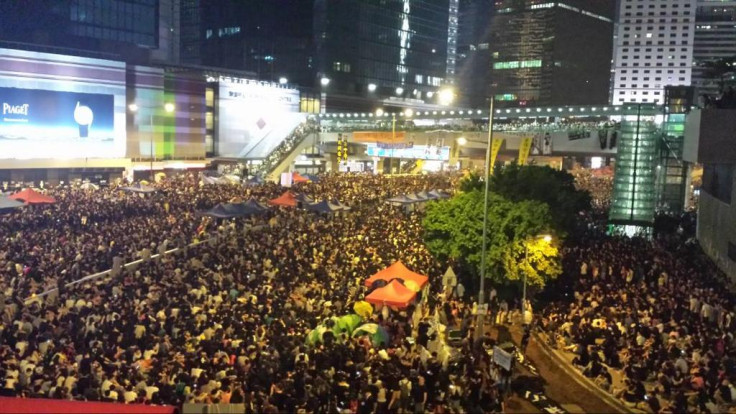Hong Kong: City Leader Orders Protestors To Quit By Monday
Chief executive CY Leung threatens to take 'all action necessary' to end protests

Pro-democracy activists in Hong Kong have been warned to disband on Monday by the city's chief executive CY Leung, as the relatively peaceful protests begin to turn violent.
The pro-democracy activists – a mixture of Occupy Central supporters and student campaigners – demanded that Leung resign by midnight (local time) and for Beijing to allow the city to hold free elections to select his replacement.
So far, Leung has refused to consider any of the activist's demands, but did offer to hold talks.
In a statement, Leung has now said that the protestors must allow Hong Kong residents to "resume their normal work and life" and bring the week-long protests to an end.
If the protests do not end tomorrow (Sunday, 5 October), according to the BBC, Leung has threatened to use any methods at his disposal to break up the protests.
"The government and the police have the responsibility and resolution to take all actions necessary to resume social order and let the government and all seven million citizens resume their normal work and life," he said.
Some protestors have threatened to invade government buildings if Leung does not resign.
Although Leung did not explicitly state he would authorise the use of force to disband the protests, his statement has been viewed as an ultimatum.
main road outside #hongkong chief exec office. student protest leaders asked others not to occupy this road pic.twitter.com/Q480rVvhLg
— Juro Osawa (@JuroOsawa) October 2, 2014It remains to be seen how the protestors will react to this threat, which could be associated with the Tiananmen Square massacre of 1989. Unlike mainland China, where any mention of the pro-democracy protests in Tiananmen Square and the subsequent violence is forbidden, Hong Kong residents will be aware of those events due to the lack of censorship by Beijing in the city state.
The protests began a week ago, after Leung announced that candidates in the next city leader election would be vetted and selected by China's central government in Beijing.
Initially a small protest located in the Hong Kong's financial district, now tens of thousands of pro-democracy protests have made camp in Admiralty, Causeway Bay, and Mong Kok areas of Hong Kong.
'Hong Kong government working with Triads'
The Hong Kong Federation of Students – one of the factions organising the protests – has withdrawn from proposed negotiations, after Friday's violence, and has accused the Hong Kong government of allowing members of Chinese organised criminal gangs, Triads, to attack protestors.
Hong Kong Labour Party leader Lee Cheuk-yan has echoed these accusations, according to the South China Morning Post, accusing Leung's administration of standing by as the pro-democracy protests were attacked.
"When students were protesting peacefully on Sunday, police fired tear gas at them; but now, the police did nothing to the people who actually attacked the occupiers," the Post quotes Lee as saying. "It has shown a big contrast."
"Triad members were mobilised to support Leung in his town hall meeting earlier. Such things have never happened in the previous administration [led by Donald Tsang Yam-kuen]."
Hong Kong's security chief, Lai Tung-kwok, has denied these claims.
Tensions between protestors and workers in the Mong Kok commercial district led to violence overnight, which saw nearly 20 people injured, and at least 19 arrested.
© Copyright IBTimes 2024. All rights reserved.





